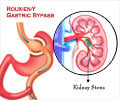Gastric bypass surgery that is often done as a measure for weight reduction may have the potential to reduce risks of heart disease.
Gastric bypass surgery that is often done as a measure for weight reduction may have the potential to reduce risks of heart disease.
One of the most common procedures to control morbid obesity is by gastric bypass surgery that reduces the size of the stomach and allows the food to pass to the small intestine much faster. Together with psychological and behavioral support, this procedure has become one of the ways to control obesity through lasting weight loss.A study done by Stanford University School of Medicine shows that weight loss surgery for the obese people can improve their cardiac risk factors and most significantly improve on their triglycerides and C-reactive protein.
A person is considered obese when he’s got a body mass index of 30 and above, while he’s called morbidly obese with a BMI of 40 and above. Obesity is not only a socially tainted physical feature, recent research also links it with a variety of physical risks like that of cardiovascular disease, diabetes, arthritis, asthma, sleep apnea and even cancer.
The new study shows that obesity surgery is not only good for its cosmetic value and its role in weight loss, it is also important for the reduction in the health risks associated with obesity.
Reference: Stanford University School of Medicine, news release, July 2005











